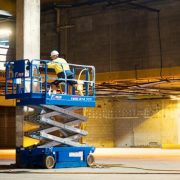Access Equipment Jobs: Roofer
Roofers spend most of their time working at height and are frequent users of access equipment.
What Roofers Do
When you think of ‘roofers’, an image of a bloke laying aluminium or tiles probably comes to mind. It’s true that roofers install a variety of materials, but there’s more to it than that. Roofers need strong balance and overall visual-spatial awareness. This is a must for working at heights, as well as a strong problem-solving ability for those tough-to-fit areas, such as around chimneys or vents. A Roofer also has to be able to interpret construction drawings and, in some cases, create detailed plans for a project.
Roofers must be in good physical condition, as it’s a job that’s demanding on your body. You will constantly be lifting and loading heavy materials. Access equipment helps out with this; for especially heavy materials, a telehandler will be in order. But more basic access equipment like scaffolding might need to be erected and dismantled on site, as well.
You’ll be working with some pretty heavy duty tools and materials, so it’s helpful if you have a strong competency in that area. Depending on your specialty, you might be working with nails, staples, gutters and other drains, weatherproofing, cement mortar and paint, just to name a few. Because so many aspects of roofing carry an inherent risk, roofers must constantly be aware of their surroundings and be able to assess potentially harmful situations.
How To Become a Roofer
In most parts of Australia, roofers need to have a builder’s license. However, you should refer to your local industry association to learn about the specific requirements in your area. Regardless of where you intend to work or what specialty you pursue in roofing, all roofers must complete a Work Safely at Heights training from a Registered Training Organisation. Among other things, this will ensure that while working with access equipment such as scissor lifts or vertical lifts, you know how to minimise your risks.
Most roofers get into the industry by completing an apprenticeship or traineeship before passing the exam for licensing. Some of these apprenticeships are comprehensive, while others will focus on a specialty, such as roof tiling or roof plumbing. In terms of general education, most employers require Year 10, but to find out the exact requirements of apprenticeships in your area, contact local construction mentors.
Being a roofer is an exciting job that lets you work outdoors and stay active. No two days are the same in this industry, so being open to new challenges is a must. Force is proud to supply roofers with a full range of access equipment, and we hope this article has made you a little more familiar with this great career.



